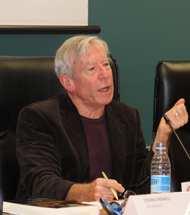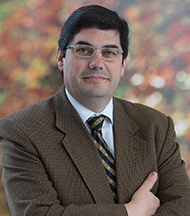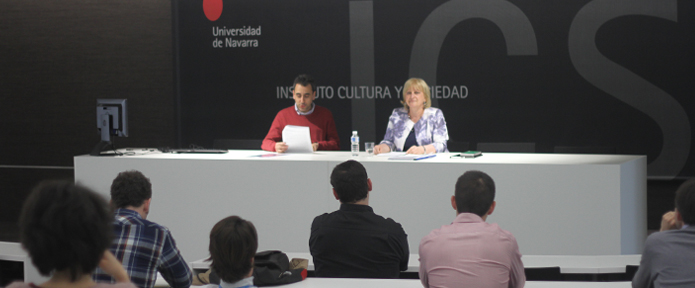"How do we know that we do not live in the Matrix? This is the same question that philosophers have posed since Descartes"
Steven Crowell, a professor at Rice University (USA), assessed some of contemporary philosophy’s challenges in the framework of an international meeting organized by the ICS

FOTO: Elena Beltrán
Steven Crowell, Professor of Philosophy at Rice University (USA), participated as a speaker in the international workshop entitled, “Ways of Being Bound,” which was organized by the Emotional Culture and Identity project of the Institute for Culture and Society (ICS). It received financial support from the Spanish Ministry of Economy within the framework of the “Bonds, emotions and practical rationality” subproject.
In his presentation, he addressed the issue of self-binding, which he defines as "a commitment to living a certain way that guides future actions and binds people, elevating them to what is best."
He also conducts research on twentieth-century European philosophy, phenomenology and Nietzsche, among others. In addition, he also has taken special interest in the topic of the public sphere and communication.
Recently, philosophy has lost favor in secondary education in some countries. What are your thoughts on the future of philosophy in general?
In the United States, almost no philosophy is taught at the secondary level. There is a movement to reintroduce it and I think that is a worthy goal. Although it is difficult to identify the exact right time to raise philosophical questions, because it requires a certain maturity to do so, I believe that high school students have a natural philosophical bent. They like to ask big questions and to debate them.
But the future of philosophy is much more closely linked to the structural changes happening at the university level, which tend to emphasize funding issues, as well as productivity, remuneration and the attraction of external funding. Thus, people (parents and students) who want to develop useful skills in the labor market squeeze out the humanities, but this means losing the most important part of philosophy and the humanities.
My hope is that our culture somehow re-develops a taste and understanding for education in a sense of construction or cultivation that comes with profound thinking about philosophical problems or how to interpret literary texts. If not, an essential part of our humanity would be lost and we would live in an inter-virtual reality instead of reality.
What are your thoughts on the future of phenomenology, one of your lines of research?
Phenomenology studies the way in which everything presents itself to me in my first-person experience. I think that if taken in a very narrow sense, it is aligned with any other movement within continental philosophy: phenomenology, hermeneutics, existentialism, deconstruction, post-structuralism, etc. But I think that phenomenology is a way of doing philosophy, like analytic philosophy. Therefore, I believe that its future is in the hands of those who consider that this way of doing philosophy is constructive and instructive. And I see signs that it is very widespread because, although many people do not identify themselves as phenomenologists, they are doing phenomenology, and in this sense I believe that the future is bright.
Do you think that phenomenology is still relevant in this virtual world?
That is a complicated issue. Phenomenology is relevant wherever we experience something. As I said, it basically studies the way in which everything presents itself to me in my first-person experience, so the virtual world poses different challenges to explain the “who.” I experience, for example, interacting with robots and try to see if I am talking to another person. I also experience interaction with an avatar whose identity is linked to someone, at a distance, adopting an identity that may (or may not) have something to do with who the person really is. When I'm face to face with someone, I can ask them questions and interpret their body language. However, I can see very little electronically in terms of how I understand who the real person is (if he is a real person).
How is the virtual world different from the real world?
I think they are very different, although some say that the virtual world is very convincing. There is the whole question of how we know we are not living in the Matrix. This is the same question that philosophers have been asking since Descartes. How can I know that my experience is not just a function of an evil demon that makes me have these experiences? Or how do I know that I am not a brain in a jar and that all of my lived experience is manipulated by a scientist? Nothing that I consider real is real at all. I cannot go into the answers that phenomenology can give to these questions, but they are challenging. Skepticism has always been a challenge for philosophy. The basic idea is that scenarios themselves are unintelligible without a non-virtual basis, that is, actual reality. You cannot formulate the problem without presupposing the priority of our real experience. (And this is just the beginning of the argument).
Do you think the Internet has changed the meaning of the public sphere?
Yes, but we have mediated experience in the public sphere for a long time. The original Greek notion of the public sphere was face-to-face democracy— small communities in which people make decisions in the agora where they can confront others directly. We have not had that kind of situation for a long time. And I think the Internet has modified the scope of things to an unpredictable global extent. On the one hand, it democratizes people, empowers them, gives them a voice, and we have seen many examples of this. But, at the same time, it empowers the destructive forces that in the past ended up marginalized. And the marginalization of certain points of view also seems to contradict the notion of freedom, but if false and irresponsible discourse is not marginalized somewhere, political chaos results. That is why I believe that control is also important in public discourse unless it is in a very small face-to-face community in which a person making a statement is directly responsible for that statement. The Internet erases that responsibility.
Who do you think is a political actor now?
We all are, obviously not all of us have a position, but I think that a political actor is he who takes a position on something that concerns the polis. And at one level or another almost everything we do concerns the polis. What is distinctive about the political is that I assume who we are or should be, as it refers particularly to the constitution of “us.” So, the meaning of who we are and what we have to do is the essential domain of politics. Most of the decisions we make have some connection to the original constitution of who we are or make reference to it in some way. Of course, this is a very general conception of politics, but it is consistent with the notion of democracy, since the political actor therein is an individual actor.



